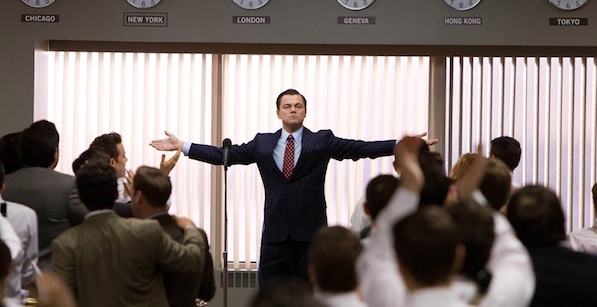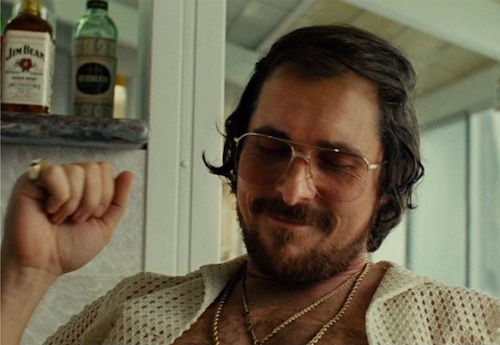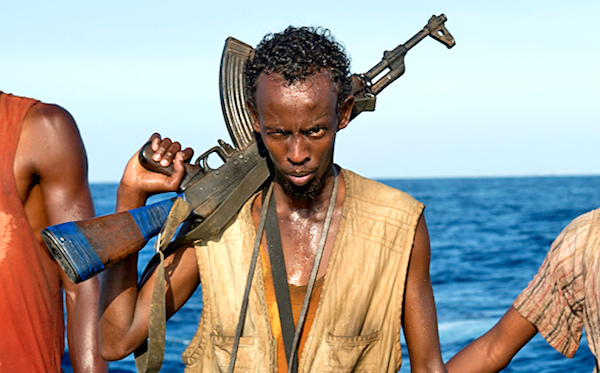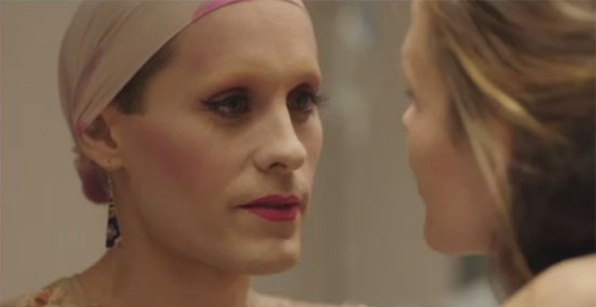[This is the second of a three-part dialogue between R. Kurt Osenlund, Managing Editor of The House Next Door at Slant Magazine, and Kevin B. Lee of Fandor’s Keyframe, in response to the Oscars 2014: Video Evidence series produced by Kevin Lee on Keyframe.]
Kurt Osenlund: Kevin, since we kicked off the actress chat by discussing the performance that divided us most (Lupita Nyong’o’s), I figure we may as well follow suit in dishing about the men. With Joaquin Phoenix (Her), Oscar Isaac (Inside Llewyn Davis), Tom Hanks (Captain Phillips), and Toni Servillo (The Great Beauty) all out of contention, my favorite among the nominated lead actors is the only one of my personal five who made the cut: The Wolf of Wall Street‘s Leonardo DiCaprio. This is a performance you equated to a “three-hour stadium rock concert,” and I really can’t argue with that statement, but it’s how we each responded to that rock concert that’s worth evaluating.
[Watch what Kevin had to say about Leonardo DiCaprio’s performance, and the other Lead Actor nominees:]
DiCaprio is an actor I’ve been defending for years, against everyone from colleagues, who complain that he plays the same character each time out, to my parents, who will still insist he looks like a “little boy” when his hair is as white and sparse as Bruce Dern’s. In his turn as Jordan Belfort, DiCaprio does indeed, as you observed, try hard to “overpower you as a viewer,” and I’m sure some of those aforementioned colleagues would say he’s merely pumped up the volume on what he brought to the egocentric Jay Gatsby, Howard Hughes, and Frank Abagnale, Jr.
But, I think, in a technique not unlike Meryl Streep’s, DiCaprio is capable of padding that volume with riveting dramatic depths, which vary depending on the role. With Gatsby, it was impossible nostalgia for lost love and lost time. With Abagnale, it was, indeed, boyish innocence. And with Belfort, it’s an absolutely fearless swan dive into the morally bereft black hole of an irredeemable douchebag’s psyche. I don’t think that kind of commitment is as easy as it might look, and I think DiCaprio’s situation here is unique in that it’s such a harmonic partnership between master and muse, with DiCaprio serving as an exceedingly in-sync conduit for Martin Scorsese’s pitch dark, debauchery-laden satire.
I find The Wolf of Wall Street equally repellant and fascinating, and I think DiCaprio—as a character I never once found myself rooting for, as some did with a streak of guilt—is in many ways responsible for that. He is greed, unflinchingly, terrifyingly personified. And while I’m willing to entertain, if not wholly agree with, the argument that his work is “one-note” when compared to his competitors, how can anyone complain when the note is played with such astonishing dexterity?
Again, some of this just comes down to a matter of personal taste. In watching your “Video Evidence” clips, I think what I’ve appreciated most is not just your hunger for nuance in acting, but your ability to sniff it out. For example, while DiCaprio’s work may be more my cup of tea (or is it bag of Quaaludes?) than yours, you nevertheless opened my eyes to the hidden-in-plain-sight merits of American Hustle‘s Christian Bale, who, as you said, plays a kind of “hide-and-seek” with both his fellow actors and the audience.
I don’t think Bale is delivering anything close to the complexity of co-star Amy Adams’s performance, but his turn becomes so much more compelling when you consider that he’s leading this cast in an almost stealth sort of way, despite all the hair and histrionics. I still think that one of the reasons American Hustle works is its actors, whether with full intention or not, employ a certain shrillness that help hoist it to the level of spectacular trash—“rotten and delicious,” just like Rosalyn’s fingernail topcoat. Nonetheless, you make a terrific case for the fact that, in this category, Bale’s the one anchor whose weight, in accordance with his film’s raison d’être of deception, slips past you.
Kevin: Kurt, I definitely wish Phoenix was one of the five in contention, and I would probably swap out Ejiofor or DiCaprio in his place. I don’t mean to diminish either of those actors; despite my misgivings, Ejiofor’s is a perfectly respectable, dignified performance, and DiCaprio is impressive if only for its sustained wall-to-wall energy. But with Phoenix, I have to wonder if the people complaining about Scarlett Johansson’s faceless Oscar snub are really responding or Johansson’s vocal emoting, or if they’re really responding to how her words play out on across Phoenix’s face.
As with Sandra Bullock and Gravity, Phoenix’s performance makes you rethink how performances are constructed and how they work. In this case Phoenix really is called upon to complete Johansson’s performance. Of course that’s true whenever you put two characters in a dialogue scene, but here that dynamic is deconstructed, and Phoenix has to “embody” Johansson in ways I’ve never seen an actor do before.
I respect DiCaprio a lot as a performer, and I’ve been happy to see him take his career into jauntier terrain with this film and Django Unchained, after a dark angsty period spanning roughly from The Aviator to J. Edgar. I’m not sure if I trust myself to get into DiCaprio’s performance without slipping into a lengthy attack on why I find The Wolf of Wall Street reprehensible. I’ll just say that I agree with you that Marty and Leo’s creative visions are in full sync here, except that I find that vision shamelessly indulgent at best and stupefyingly hypocritical at worst. But I’ll offer an olive branch: if you—or anyone reading this who’s on your side—could pick out a scene or moment that you think best demonstrates why he is most deserving.
I’m delighted by your line about how Bale is “leading this cast in an almost stealth kind of way.” It’s interesting that, despite our mutual enthusiasm for American Hustle, our takes on its various elements (the relative contributions of each actor and even David O. Russell’s directing) seem to vary. It’s an unwieldy film for sure, one that puts off a lot of smart people whose opinions I respect. But personally I find that imbalance thrilling, especially when I can find a conceptual center to it all that puts us in an active position to evaluate what’s real and what’s a put-on, whether in terms of words, emotions or cinema itself. (It’s that kind of critical awareness that I think is sorely lacking in The Wolf of Wall Street, or at least it is dealt with so inconsistently that it simply tries to have its cake and eat it.)
But back to Hustle, I’m curious what you make of Bradley Cooper, whom I sense is the least likable ensemble member, though I concluded he’s most deserving in his category. And now that Ed Gonzalez has spoken on behalf of the Slant Oscar-picking team on Supporting Actor, I’m eager to hear your take as well.
[Watch Kevin’s take on Bradley Cooper and the other Supporting Actor nominees:]
Kurt: Kevin, I loved your labeling of Bradley Cooper’s Richie as “Icarus with a bad perm,” a great, poetic summation of this tragicomic character. And of the five nominees in Supporting Actor, Cooper is my favorite behind Barkhad Abdi (who I’ll get to in a moment). But still, while it stings to discover Richie’s fate, even in this story primarily stocked with “bad” people, I’m not sure the tragic side of what Cooper offers is quite so rich as to equal a performance that’s “remarkably complex.”
I believe Cooper is a capable dramatic actor whose sheer dynamism makes him worthy of the mythological title you’ve bestowed, but I think his true talents might always lie in whirlwind, motormouthed comedy, a realm I don’t think Richie ever truly steps out of. It’s extraordinarily entertaining, and Cooper, with his ready-to-blow body language and turns of phrase, executes it beautifully. I’m just hesitant to give it more credit in terms of depth.
And that, at the risk of jumping forward and dipping into our third-round, post-actor chat, gets closer to the heart of my feelings about American Hustle in general. For now, I’ll simply say that I prefer David O. Russell in balls-out, non-earnest mode—a mode in which I believe he is, finally, operating in once more with this off-the-rails and unapologetically veneer-obsessed spectacle.
I actually think Cooper and his acting merits serve as a great reflection of how American Hustle works exceedingly better for me than Silver Linings Playbook. In the latter, Russell employed Cooper’s talents for an overeager character whose cartoon-grade mental illness was pandering at best and deeply offensive at worst. In the former, the director calls on the actor again, but to join a high-wire act of costume comedy for which Cooper is wonderfully suited.
Ironically enough, there’s so much less feigned in American Hustle than in Silver Linings Playbook and The Fighter put together. For all its nominations, it isn’t baiting Oscar voters with put-upon “issues” or pseudo “indie” domesticity. Everything is right there for us on the all-important surface (which, to prove one really can’t discuss this film without encountering contradictions, doesn’t mean, as we established in our actress chat, that their isn’t any depth to be found).
Now that my head feels like a science oven (call it The American Hustle Effect), I think I’ll shift gears to talk about the estimable Barkhad Abdi, one of those lovely Oscar newbies whose off-camera persona rewards you for already rooting for his performance. In your “Video Evidence” clips, you’ve spoken often about how actors’ eyes can heighten the caliber of their work, and while Abdi’s glaring peepers as Captain Phillips‘ Muse may be the most obvious example of such, I found myself glued to this guy’s gaze even when he wasn’t glowering into the stirred sole of Tom Hank’s titular sailor.
Abdi manages the almost inexplicable feat of conveying not just menace, but also vigor and, eventually, a certain men-in-crisis solidarity with a face one might justifiably describe as “blank.” The actor’s singular facial structure, naturally, works to bolster this effect, but Abdi is always keenly letting us know that there’s a great deal happening behind those eyes.
And you’re right: Unlike Dallas Buyers Club‘s Jared Leto, Abdi dodges the stereotypical pitfalls inherent in his role. I do think director Paul Greengrass and writer Billy Ray deserve credit for how they weather the sociopolitical trickiness of their clearly inflammatory subject matter (I’m still scrubbing from my memory a Facebook comment that read, “He should have just shot that black pirate”), but it’s on Abdi’s shoulders to express that Muse isn’t just formidable, but also savvy and even learned.
As I wrote in my review of this film for Slant, Muse unequivocally has America’s number. He insists he’s not Al Qaeda, in hopes of squelching the ultimate fear of modern U.S. citizens. He knows how to play to America’s trademark sentimentality by holding a gun to Phillips’s head and fending off a helicopter. Even his repetitious phrase, “Everything is going to be okay,” is tellingly echoed by the American medic who tends to Phillips in the closing moments. This was all penned by Ray, but Abdi sells it with persuasive mystery, making Muse authoritative and alluring even when he’s pitiable.
You served up such sublime observations about Joaquin Phoenix, including the loaded statement that he has to “embody” Scarlett Johansson’s Samantha, that I can really just cosign, lest I continue to entertain the notion that I’m actually corresponding with the swooningly, awesomely romantic Spike Jonze himself. (I will say this: one element of Her I absolutely loved, and might have hinged my review on had I written one, was the safety pin with which Theodore propped up Samantha in his shirt pocket. I don’t think I’ve read a piece in which any other writer acknowledged this—an incredibly trivial, no-tech object that serves an incredibly vital purpose, allowing Samantha to see her lover’s world from his perspective. The aching symbolism packed into that tiny, precarious safety pin alone is testament to Jonze’s genius.)
As for your DiCaprio olive branch… good question. Since it is, for me, one of the most soullessly unnerving scenes in The Wolf of Wall Street (behind the bit that sees a female employee get her head shaved publicly for a boob job), I’m inclined to respond by saying that DiCaprio’s fuck-it-I’m-not-leaving speech best exemplifies his should-win merits. It’s the moment in which my jaw just finally dropped at how thoroughly DiCaprio hurled himself into this madly cacophonous role, presenting, with dizzying skill and stamina, what I do see as bravery (with full respect of how heedlessly “bravery” gets tossed around in regard to acting).
But that somehow feels like too knee-jerk, or maybe pedestrian, a segment to choose, so I’m going to have to ultimately go with Jordan and Donny’s (Jonah Hill) phone-cord grudge match, which, appropriately, is for me the best acted and directed scene of the film. Mind you, I’m not including the paralysis-hindered, intoxicated crawl to the Lamborghini, which I actually found to be too broad for Scorsese’s talents. But the scene in which Jordan is straining to get at Donny by all means necessary, literally pulling his way toward him to fend off getting busted, DiCaprio is neck-deep in his physical, dramatic, and, indeed, comedic commitment to this part. And that’s to say nothing of the bonus that Jordan, in an effort to preserve his odious daily grind, is clinging to a life line.
R. Kurt Osenlund is Managing Editor of Slant Magazine’s The House Next Door. Critic & contributor for Slant, Filmmaker, Details, Indiewire, Esquire, Time Out NY, RogerEbert and other publications. Follow him on Twitter.
Kevin B. Lee is a filmmaker, critic, video essayist and founding editor of Keyframe. He tweets at @alsolikelife.







